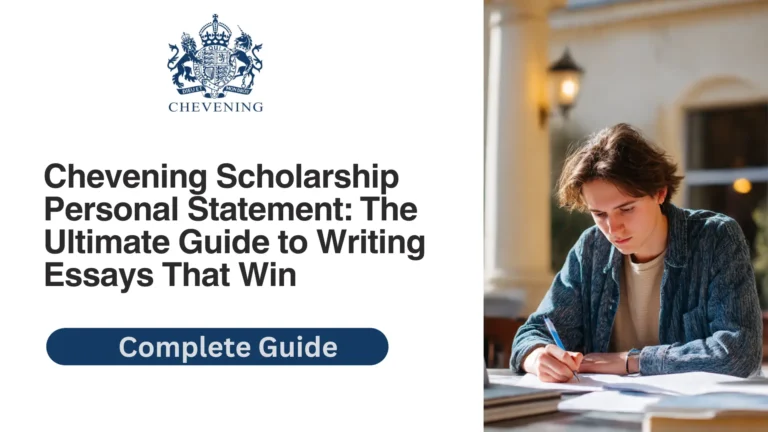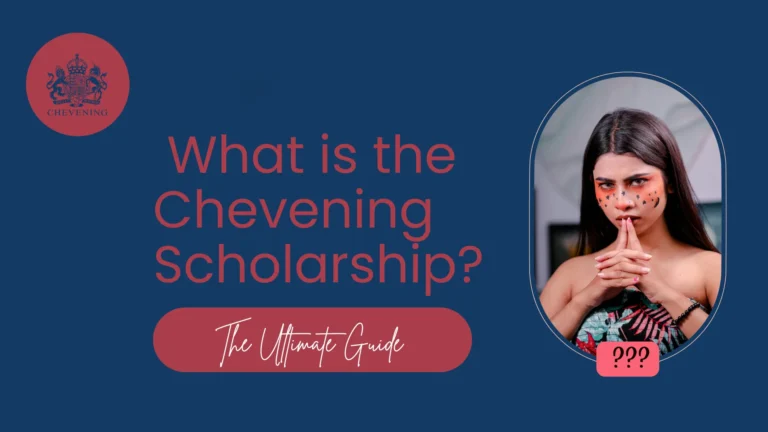Chevening UK Universities: The Complete Guide to Choosing Where You’ll Actually Thrive (Not Just Survive)
Let me guess—you’re sitting there with the Chevening application open, staring at those three university choice boxes like they’re about to determine your entire future. Which, to be fair, they kind of are. But here’s what nobody tells you when you start Googling “Chevening UK universities”: choosing where to study matters way more than which fancy name you recognize.
I’ve watched hundreds of Chevening applicants make the same mistake. They see “Oxford” or “Cambridge” and immediately think that’s their golden ticket. Meanwhile, someone else quietly applies to three universities they’ve actually researched—places where their specific course is brilliant, where the faculty aligns with their interests, where the location makes sense for their career goals—and guess what? They’re the ones who end up with unconditional offers and life-changing experiences.
So let’s talk strategy. Real strategy, not just prestige-chasing.
How to Write a Winning Chevening Networking Essay: Your Complete Guide
How Many UK Universities Actually Accept Chevening Scholars?
Right off the bat: nearly every accredited UK university accepts Chevening scholars. We’re talking about 150+ institutions across England, Scotland, Wales, and Northern Ireland. The scholarship doesn’t limit you to a select few—it opens up the entire British higher education landscape.
But here’s the thing that catches people off guard: just because a university accepts Chevening scholars doesn’t mean they accept you. Each institution has its own entry requirements, and Chevening funding doesn’t magically lower those standards. In fact, some programs are so competitive that Chevening scholars face the same brutal admission rates as everyone else.
The official Chevening course finder lists thousands of eligible programs. Yes, thousands. Which sounds great until you realize you need to narrow that down to exactly three choices. No more, no less.
The Three-Choice Strategy That Actually Works
Here’s where most people get it wrong. They pick three universities randomly—maybe one they’ve heard of, one their friend recommended, and one that sounds impressive. Then they wonder why their application feels scattered and unconvincing.
Think of your three university choices like a investment portfolio. You need:
One reach choice: This is your ambitious pick. The university or program that’s slightly above your current qualifications but not impossible. Maybe you’ve got a 2:1 and they typically prefer First Class degrees, but your work experience is exceptional. Or perhaps the program acceptance rate is 10%, but your research interests align perfectly with a faculty member’s work.
One solid match: This is where your qualifications align beautifully with their requirements. Your academic background fits, your professional experience makes sense, and the program outcomes match your career goals. This is your “should definitely get in if I write a strong application” option.
One safe option: And no, “safe” doesn’t mean “substandard.” It means a university where you exceed the minimum requirements and where you’d genuinely be happy studying. This is your insurance policy, and honestly? Sometimes these turn out to be the best experiences because you’re not constantly struggling to keep up.
Russell Group vs. Everyone Else: Does It Really Matter?
The Russell Group—24 research-intensive universities including Oxford, Cambridge, Imperial, and LSE—gets all the attention. And sure, they’re excellent. But I’m going to say something controversial: for many Chevening scholars, a Russell Group university isn’t necessarily the best choice.
Why? Because Chevening isn’t just about prestige. It’s about leadership development, building networks, and preparing you to create change in your home country. Sometimes specialist institutions or teaching-focused universities deliver better outcomes for specific goals.
Take Cranfield University. Not Russell Group. Doesn’t even admit undergraduates. But for management, aerospace, or defense? It’s exceptional. Cranfield Chevening scholars often have better career outcomes than those at some Russell Group universities because the programs are so specialized and industry-connected.
Or consider universities like Bath, Loughborough, or Lancaster—consistently ranked at the top for specific subjects but not in the Russell Group. If you’re studying development economics, Bath might serve you better than a generic economics program at a “bigger name” university.
Let’s Talk About the Obvious Choices: Oxford, Cambridge, and LSE
I know you’re thinking about them. Everyone does. And look, if your field is there, and you’ve got the credentials, and you’d genuinely thrive in that environment—go for it. These institutions are prestigious for good reasons.
But here’s what the glossy brochures don’t tell you:
Oxford and Cambridge operate on a collegiate system that can feel isolating if you’re not prepared. You’re competing with some of the brightest minds globally, which is inspiring but also intense. The tutorial system is brilliant for some people and overwhelming for others. And here’s the kicker: some Oxford or Cambridge programs are less highly regarded than the same subject at other universities. The institution name doesn’t guarantee the program quality.
LSE is phenomenal for social sciences, economics, and international relations. But it’s also in central London where living costs will drain any supplementary funds you have frighteningly fast. You’ll spend significantly more on accommodation and daily life than you would at a university in, say, Durham or Exeter.
Imperial College London dominates in science, technology, engineering, and medicine. But if your background isn’t rock-solid in these areas, you might find yourself struggling rather than excelling.
The point? These universities should be on your list because they’re right for your specific goals—not because they sound impressive at dinner parties.
The Universities Nobody Talks About (But Probably Should)
Let me introduce you to some Chevening UK universities that punch way above their weight:
University of Sussex has an exceptional development studies program. If you’re in international development or policy, Sussex often outperforms much more famous institutions. Plus, Brighton is an absolutely lovely place to live.
University of Leeds offers fantastic programs in engineering, business, and social sciences with strong industry connections. Leeds is also significantly more affordable than London while still being a major UK city.
Durham University combines collegiate experience (similar to Oxbridge) with slightly less intense competition and beautiful surroundings. Their business school is particularly strong.
University of Bath consistently ranks near the top for student satisfaction and graduate outcomes. Their management and engineering programs are first-rate.
University of Glasgow is one of the oldest universities in the English-speaking world, with exceptional research credentials and a vibrant international community. Scotland also offers unique cultural and professional networking opportunities.
| University | Best Known For | Living Costs (Monthly) | Chevening Scholar Community |
|---|---|---|---|
| Oxford | Humanities, PPE, Law | £1,200-1,500 | 50-70 annually |
| Cambridge | Science, Engineering | £1,200-1,500 | 50-70 annually |
| LSE | Economics, Politics, IR | £1,400-1,700 | 60-80 annually |
| Imperial | Engineering, Medicine | £1,300-1,600 | 40-60 annually |
| Durham | Business, Law | £800-1,000 | 30-40 annually |
| Bath | Management, Engineering | £900-1,100 | 25-35 annually |
| Glasgow | Medicine, Social Sciences | £700-900 | 30-45 annually |
| Leeds | Business, Engineering | £750-950 | 35-50 annually |
| Sussex | Development Studies | £900-1,100 | 25-35 annually |
| Exeter | Politics, Climate Science | £850-1,050 | 30-40 annually |
Note: Living costs are estimates and vary based on lifestyle
How to Actually Use the Chevening Course Finder
The official Chevening course finder is simultaneously the most useful and most overwhelming tool you’ll encounter. Here’s how to use it without losing your mind:
Step 1: Start with subject area, not university name. What do you actually want to study? Be specific. Don’t just search “International Relations”—narrow it to “Conflict Resolution” or “Development Economics” or whatever your actual specialization is.
Step 2: Filter by course format. Most Chevening scholars do one-year Master’s programs, but some courses are longer or structured differently. Know what you’re getting into.
Step 3: Read beyond the course title. Two programs called “International Development” at different universities can be completely different in content, methodology, and outcomes.
Step 4: Check the faculty. Who’s teaching? What’s their research focus? If you’re interested in climate policy, and a university has three professors actively publishing in that area, that’s gold.
Step 5: Look at the alumni outcomes. Where do graduates from this program end up? Does that align with your goals?
The Location Question Nobody Asks
Everyone focuses on university prestige. Almost nobody asks: “Where do I actually want to spend a year of my life?”
London is exciting, culturally diverse, and exhausting. You’ll spend hours on the Tube and a fortune on everything. But the networking opportunities? Unmatched.
Edinburgh is stunningly beautiful and intellectually vibrant, but it gets properly cold and dark in winter. If you’re from a tropical country, this matters more than you think.
Manchester, Birmingham, and Leeds offer city life without London prices. They’re diverse, culturally rich, and have excellent transport connections.
Durham, Exeter, and Bath are smaller but offer tight-knit communities where it’s easier to form deep connections. You’ll actually get to know your classmates rather than being one face in a sea of thousands.
What If Your Dream University Rejects You?
This happens. More often than people admit. You can win the Chevening scholarship but still get rejected by universities because their admission process is separate and independent.
Here’s what you need to know:
Your Chevening application and university applications are evaluated separately. The Chevening selection panel doesn’t see your university admission status, and universities initially review your application without necessarily knowing about Chevening funding (though they’re informed if you progress).
Rejection from one or two universities doesn’t kill your Chevening scholarship. You only need one unconditional offer from your three choices to activate your scholarship. This is exactly why the three-choice strategy matters.
Conditional offers are common and manageable. Most commonly, conditions relate to English language requirements or final degree results. As long as you meet the conditions before your program starts, you’re fine.
If all three reject you, you’ll need to reapply to universities while maintaining your Chevening offer (if you’re selected). The Chevening team can guide you through this process—it’s rare but not unheard of.
The Courses That Are Actually Eligible
Here’s a surprise: not every postgraduate course at a UK university is Chevening-eligible. The program must be:
- Full-time
- On-campus (no distance learning)
- Taught or research Master’s level
- One academic year minimum
This rules out certain MBAs, part-time programs, most doctoral programs, and undergraduate degrees. Always verify through the course finder that your specific program qualifies.
Some universities have dozens of eligible courses. Others might only have a handful. This is particularly relevant for specialist institutions—Cranfield has excellent programs but not in every field.
Chevening Reference Letters: The Complete Guide to Getting Stellar Recommendations
Making Your Choices Complement Each Other
Your three university choices should tell a coherent story in your overall Chevening application. Selection panels notice when your choices don’t make sense together.
Example of coherent choices:
- University 1: LSE – MSc Public Policy (focus on economic development)
- University 2: University of Manchester – MSc Development Finance
- University 3: University of Bath – MSc International Development
See how these all align with development economics? That’s a focused, strategic application.
Example of incoherent choices:
- University 1: Imperial – MSc Mechanical Engineering
- University 2: Oxford – MSc International Relations
- University 3: Edinburgh – MSc Creative Writing
These don’t tell a story. They suggest you don’t know what you want, which is red flag for a scholarship looking for future leaders with clear visions.
The Application Timeline You Need to Understand
Chevening deadlines and university deadlines don’t align perfectly, which confuses people. Here’s the typical sequence:
November: Chevening applications close December-February: Apply to your three chosen universities directly June-July: Chevening interviews (if shortlisted) Late July: Conditional Chevening offers made August-September: Universities make admission decisions September: Chevening scholarships confirmed for those with university offers
You’re essentially running two parallel applications—one for funding, one for admission. Both need to succeed.
Support Systems and Chevening Communities at Different Universities
Some UK universities have established Chevening scholar communities that make your experience significantly richer. Larger universities like Oxford, Cambridge, LSE, and Imperial typically host 50-80 Chevening scholars annually, creating a built-in network.
Smaller universities might only have 10-20 Chevening scholars each year, which means a more intimate cohort but perhaps less infrastructure specifically for Chevening scholars.
Most universities have:
- International student support services
- Career counseling (crucial for your post-scholarship plans)
- Academic writing centers
- Mental health and wellbeing support
- Social and cultural societies
The quality of these services varies dramatically. It’s worth researching during your selection process—email current Chevening scholars at universities you’re considering. Most are incredibly generous with advice.
How to Write a Winning Chevening Personal Statement: Your Complete Guide to Standing Out
The Real Talk About Rankings
University rankings are useful but imperfect tools. There are multiple ranking systems (QS, Times Higher Education, Complete University Guide, Guardian) and they use different methodologies, which means universities rank differently depending on which list you consult.
More importantly, overall university rankings don’t tell you about specific program quality. A university might rank 40th overall but have the 5th best program in your field. Subject-specific rankings matter more than general reputation.
And here’s something rankings miss entirely: teaching quality for Master’s students. Most rankings emphasize research output, which is great for PhDs but doesn’t necessarily correlate with excellent teaching at Master’s level.
Questions to Ask Current Chevening Scholars
Before finalizing your choices, connect with current scholars at your shortlisted universities. Ask them:
- How accessible are professors?
- What’s the workload really like?
- Did the course content match what was advertised?
- How diverse is the cohort?
- What career support exists?
- Would you choose this university again?
The Chevening alumni network is genuinely one of the best parts of the scholarship. People are remarkably willing to help. Use LinkedIn, reach out to your country’s Chevening WhatsApp groups, or contact the Chevening secretariat to connect with alumni.
What About Scotland, Wales, and Northern Ireland?
England dominates Chevening discussions, but don’t sleep on the rest of the UK. Scotland has five universities in the global top 200. Wales offers excellent programs at Cardiff and Swansea. Northern Ireland’s Queen’s University Belfast has strong programs, particularly in conflict resolution and peace studies (rather fitting, given the history).
Scotland, in particular, offers something unique: a distinct legal system, different political structures, and a culture that’s similar to but noticeably different from England. If you’re interested in devolved governance, environmental policy, or renewable energy, Scottish universities are at the forefront.
Plus, Scottish people are genuinely lovely, and the landscapes are breathtaking. Just invest in a proper winter coat.
The Brutal Truth About Competitive Courses
Some courses are so competitive that even exceptional candidates get rejected. Oxford’s MPhil in International Relations accepts fewer than 10% of applicants. Cambridge’s Judge Business School is similarly selective. Imperial’s programs in AI and machine learning have acceptance rates in single digits.
If your heart is set on one of these ultra-competitive programs, fine—include it as your reach choice. But make sure your other two choices are realistic, or you might end up with Chevening funding and nowhere to use it.
Final Thoughts: Choose Universities Where You’ll Flourish, Not Just Impress
The most successful Chevening scholars I know didn’t necessarily attend the most famous universities. They attended universities where they:
- Found mentors who genuinely invested in their development
- Joined cohorts that challenged and supported them
- Accessed resources and networks relevant to their specific goals
- Felt comfortable enough to take intellectual risks
- Built friendships that lasted well beyond their scholarship year
That might happen at Oxford. It might happen at Sussex. It might happen at Glasgow or Bath or Durham. The “right” university is whichever institution helps you grow into the leader you’re meant to become.
Prestige is fine. But prestige without fit is misery. And misery doesn’t produce great leaders.
So when you’re filling in those three boxes on your Chevening application, don’t just think about how impressive the names sound. Think about where you’ll actually thrive. Where will you find your people? Where will you do your best work? Where will you build the knowledge, skills, and networks that will help you create change back home?
That’s your answer. That’s your choice.
Now go do your research, trust your judgment, and write one hell of an application.
Frequently Asked Questions
Can I change my university choices after submitting? No, once submitted, your three university choices are locked. Choose carefully and do thorough research before the deadline.
Do all three choices need to offer the exact same course? No, but they should align thematically with your career goals and the story you’re telling in your Chevening application. Coherence matters.
What if I get accepted to multiple universities? You’ll choose which offer to accept. Consider all factors—program content, location, costs, and career outcomes—not just prestige.
Can I apply to universities outside the UK? No, Chevening is specifically for UK universities. If you want to study elsewhere, you’ll need to explore different scholarship programs.
Do some universities prefer Chevening scholars? Universities view Chevening funding positively because it guarantees payment, but admission standards don’t typically change. You still need to meet their requirements.
Ready to start your Chevening journey? Begin by exploring the official course finder, connecting with alumni at your shortlisted universities, and crafting a university selection strategy that genuinely serves your goals. Remember: the best university isn’t the most famous one—it’s the one where you’ll do your best work.







